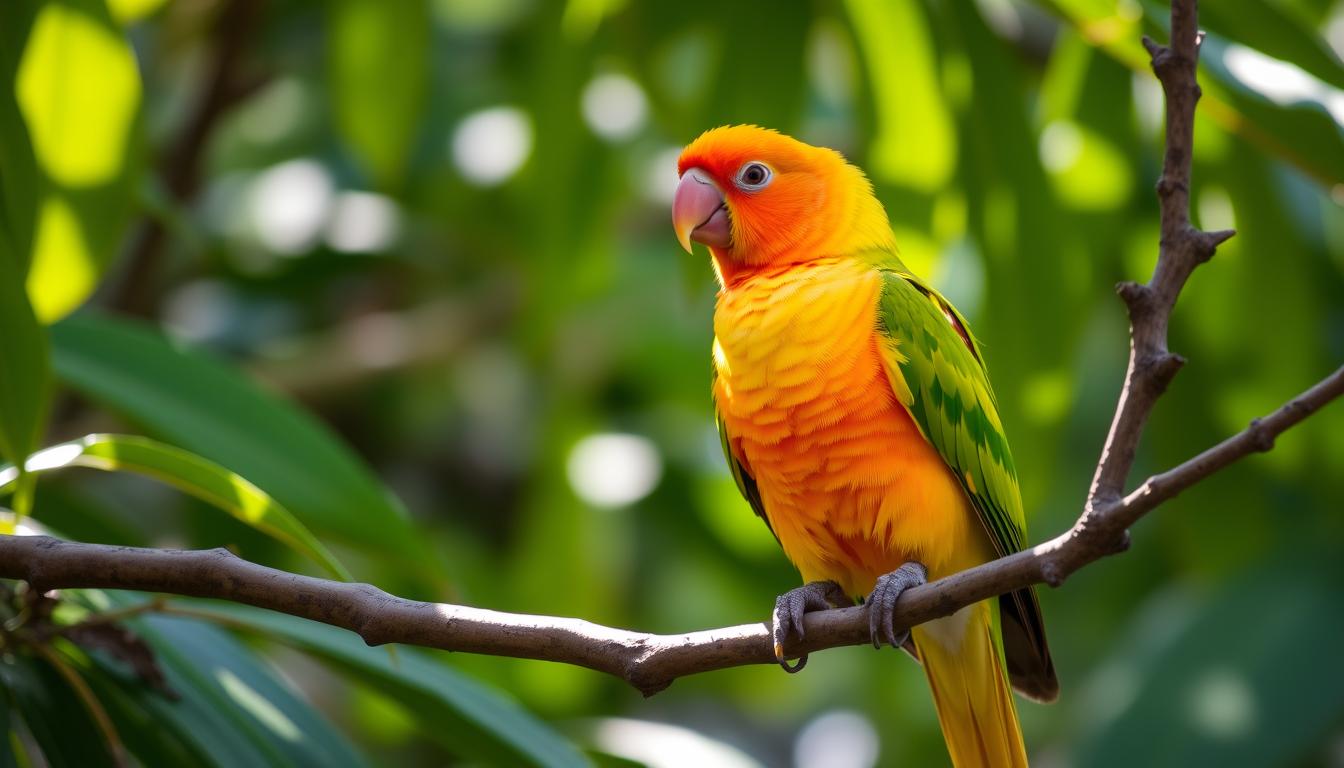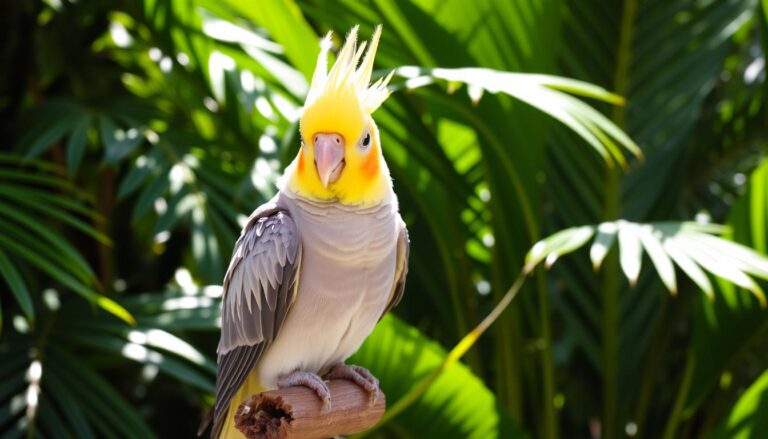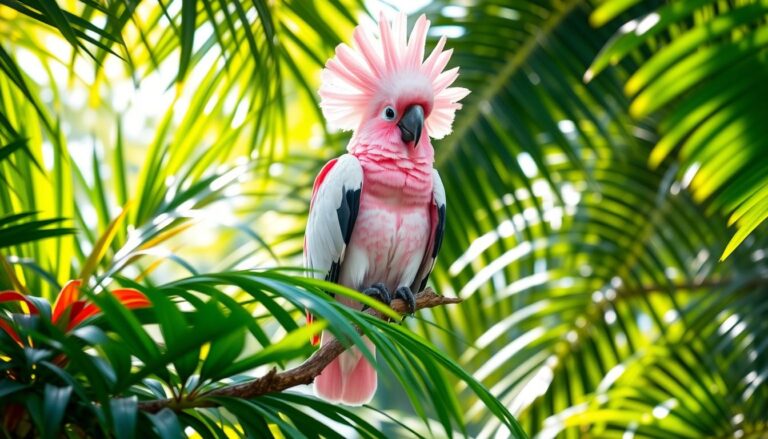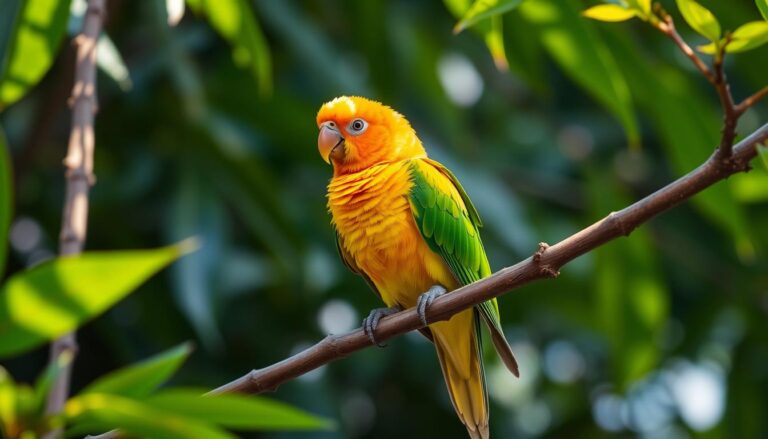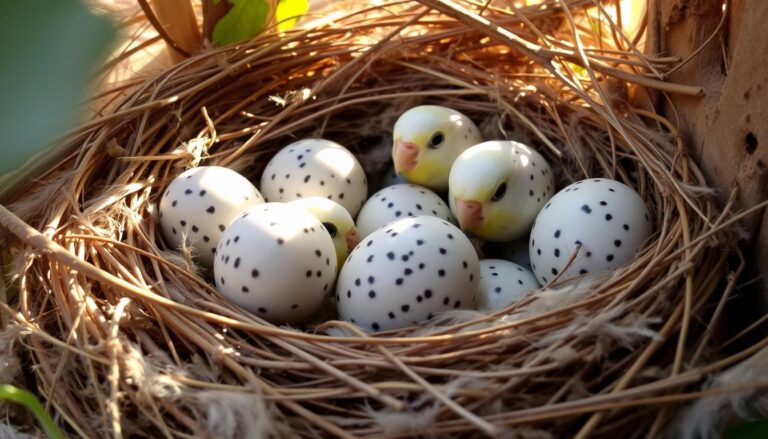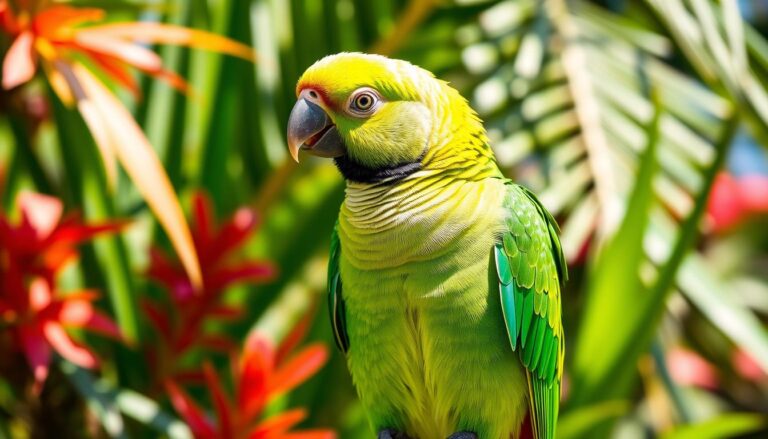Discover the Vibrant Conure Jenday: Perfect Pet Bird
Get ready to fall in love with the Conure Jenday, a true gem among parrots. These birds are known for their bright colors, lively personalities, and great companionship. They come from South America’s tropical areas and are perfect pets for those who want a lively and loving bird.
Jenday Conures stand out with their bright green, yellow, and orange feathers. But it’s not just their looks that are special. They are smart, curious, and have a charm that will win your heart. Their fun behavior, sweet sounds, and ability to form strong bonds make them perfect friends.
Key Takeaways
- Vibrant and eye-catching plumage in shades of green, yellow, and orange
- Engaging and intelligent personalities that thrive on interaction and bonding
- Excellent companions for those seeking a lively and affectionate pet bird
- Originate from the tropical regions of South America
- Require proper care and attention to maintain their health and happiness
Understanding the Conure Jenday Species
The jenday conure is a favorite pet bird, known for its bright colors and lively spirit. They come from South America’s lush forests. These parrots have a mix of orange, green, and yellow feathers, making them stand out.
Physical Characteristics and Natural Habitat
Jenday conures are about 12-14 inches long and weigh 4-5 ounces. Their feathers are a beautiful mix of colors. In the wild, they live in Brazil, Paraguay, and Bolivia. They love the dense foliage for food and shelter.
Personality Traits and Temperament
Jenday conures are playful and social. They bond well with people and love to learn tricks. The sun jenday conure hybrid is also lively and loving, making them a favorite among bird lovers.
Life Expectancy in Captivity
Jenday conures can live up to 30 years with the right care. This shows how adaptable and resilient they are. But, it means owners need to commit to caring for them for a long time.
“Jenday conures are truly remarkable birds, with a captivating blend of colors and a delightful, energetic personality. They make wonderful companions for those willing to provide them with the care and attention they deserve.”
Essential Care Requirements for Your Jenday Conure
Taking care of a Jenday conure means giving them a loving and interesting place to live. These birds need special care to stay happy and healthy. Let’s look at what your Jenday conure needs.
Spacious Cage Setup
Jenday conures love to move and play. They need a big cage to do so. Look for a cage that’s at least 24 inches wide, 24 inches deep, and 36 inches tall. This size lets them spread their wings and move around easily.
Enriching Toys and Perches
Jenday conures are smart and curious. They need toys and perches to keep them busy and active. Change the toys often to keep them interested. Make sure the perches are different sizes and textures to help their feet grow strong.
Balanced Diet
It’s important to feed your Jenday conure the right food. They need a mix of good pellets, fresh fruits, and veggies, and sometimes treats. Talk to an avian jenday conure breeder or vet to make a diet plan that’s just right for them.
Regular Veterinary Check-ups
It’s key to take your Jenday conure to the vet regularly. Going every six months helps catch health problems early. This way, your bird can live a long and happy life.
By knowing and meeting your Jenday conure’s needs, you can give them a great home. With the right care, these colorful birds will bring joy and friendship into your life for many years.
| Care Requirement | Recommended Specifications |
|---|---|
| Cage Size | At least 24 inches wide, 24 inches deep, and 36 inches tall |
| Toys and Perches | Variety of toys and perches of different sizes and textures |
| Diet | High-quality pellets, fresh fruits, and vegetables |
| Veterinary Care | Biannual check-ups with an avian veterinarian |
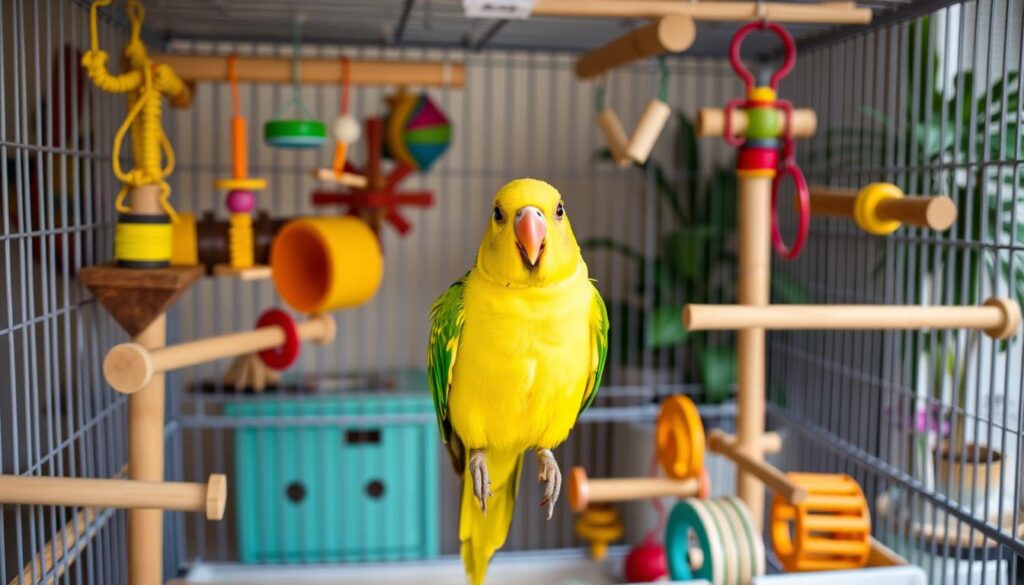
“Creating a stimulating and comfortable environment for your Jenday conure is essential for their well-being and longevity in captivity.”
Dietary Needs and Feeding Guidelines
It’s key to feed your jenday conure chicks right for their health. These colorful birds need a mix of foods to stay healthy. Let’s look at what they need to eat.
Fresh Foods and Vegetables
Jenday conures love to eat a variety of fresh fruits and veggies. Give them a range of foods like:
- Dark leafy greens (kale, spinach, collard greens)
- Carrots, sweet potatoes, and squash
- Berries, mangoes, and other juicy fruits
- Peppers, broccoli, and other crunchy veggies
Commercial Pellets and Seeds
Along with fresh foods, give them high-quality pellets. Pellets are full of nutrients. But, only give a little seed mix, as seeds have a lot of fat.
Foods to Avoid
Some foods are bad for jenday conures. Don’t give them avocado, onions, garlic, chocolate, or caffeinated drinks. Also, don’t give too many sugary or fatty treats.
By giving them a balanced diet, your jenday conure chicks will be happy and healthy. Remember, good food is the key to a long, joyful life with your bird.
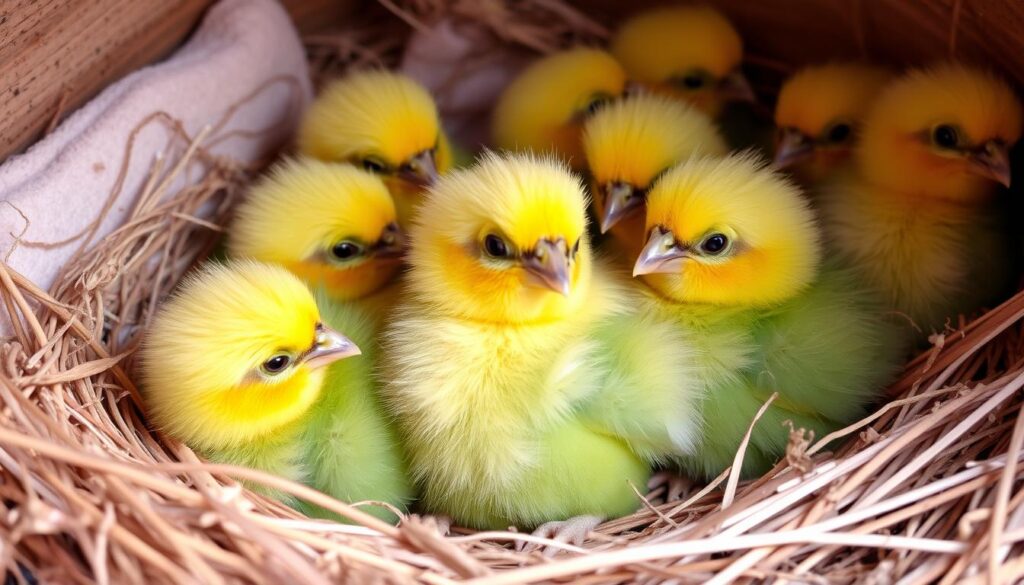
Creating the Perfect Living Space and Cage Setup
It’s vital to give your Jenday Conure a great living space for their health. The cage size is key, as these birds need room to move and play. Experts say a jenday conure cage size of 24″ x 24″ x 36″ is best.
The inside of the cage matters too. Make sure it has different perches for climbing and toys for fun. This keeps your bird active and happy.
- Provide a spacious and sturdy cage with a minimum size of 24″ x 24″ x 36″.
- Include multiple perches of varying diameters and materials for your Jenday Conure to explore.
- Enrich the cage with a variety of toys, ladders, and swings to keep your pet entertained and engaged.
The cage should feel like home for your Jenday Conure. Add natural branches and hiding spots. Keep it clean and add a bird-safe plant for fun.
Creating a fun and comfy space makes your Jenday Conure happy. A happy bird is a joy to have at home.
Training and Socialization Techniques
Having a jenday conure or sun conure as a pet means you need to work on training and socialization. These birds are playful and smart, loving positive feedback and spending time with people. Learning a few key methods can help you bond with your bird and solve any behavior problems.
Basic Commands and Tricks
Begin by teaching your conure simple commands like “step up,” “come,” and “step down.” Use treats and praise to encourage these actions. Once your bird gets the hang of it, you can teach fun tricks like turning in a circle or waving hello. Remember, training these birds takes time and patience.
Building Trust and Bonding
Building trust is key to a good relationship with your conure. Spend daily time letting your bird step onto your hand, starting with short periods and getting longer. Play gently with your bird, give them lots of toys, and pay attention to how you act and sound. With effort, your conure will trust you.
Addressing Behavioral Issues
Jenday conures might face problems like biting, screaming, or feather plucking. Finding the reason behind these issues and using positive training can help. If you’re facing serious problems, talk to a bird expert or a vet.
Learning how to train and socialize your conure can lead to a fulfilling relationship. With patience, consistency, and understanding their needs, you can bring out the best in these lively birds.
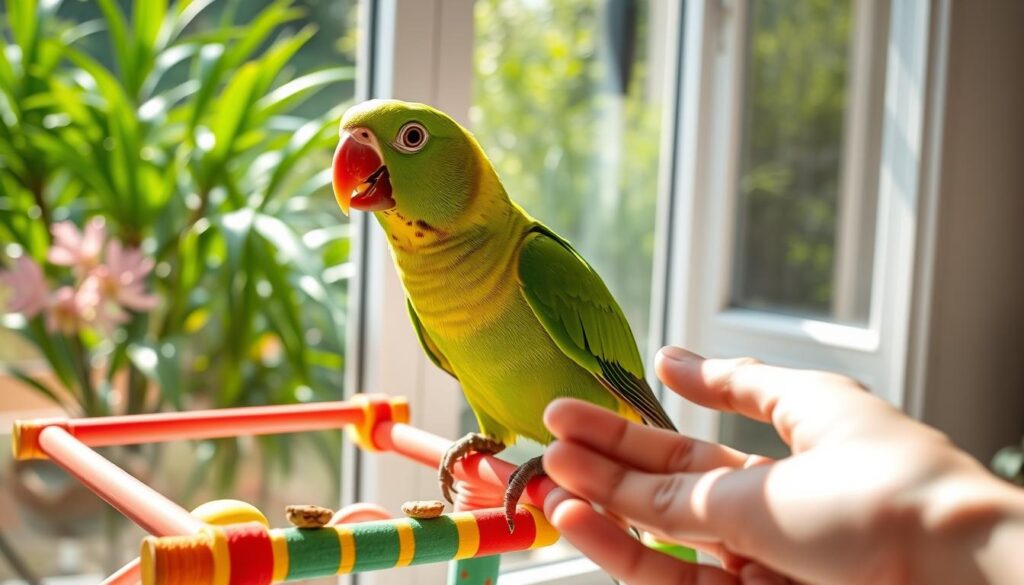
Health Care and Common Medical Concerns
As a jenday conure breeder, knowing about health issues is key. These colorful birds need careful care to stay healthy. Understanding common health problems helps keep your pet happy and healthy for years.
Regular vet visits are vital to catch health issues early. Your jenday conure breeder should team up with an avian vet. They can help with grooming, nail care, and keeping feathers in good shape.
Jenday Conures may face respiratory infections, feather-plucking, and digestive issues. Watching your bird’s behavior, droppings, and health closely is important. Quick vet visits for any issues can greatly help your bird’s health.
- Respiratory Infections: Symptoms include wheezing, nasal discharge, and hard breathing. Keeping their cage clean and well-ventilated helps prevent these problems.
- Feather Plucking: This can mean stress, boredom, or health issues. Finding and fixing the cause is crucial.
- Digestive Issues: Bad diets or eating the wrong foods can cause stomach problems. A balanced diet is essential for your bird’s health.
Being watchful, providing top-notch care, and working with your vet ensures your jenday conure breeder lives a long, happy life. With the right care, these amazing birds can flourish and bring joy to their owners.
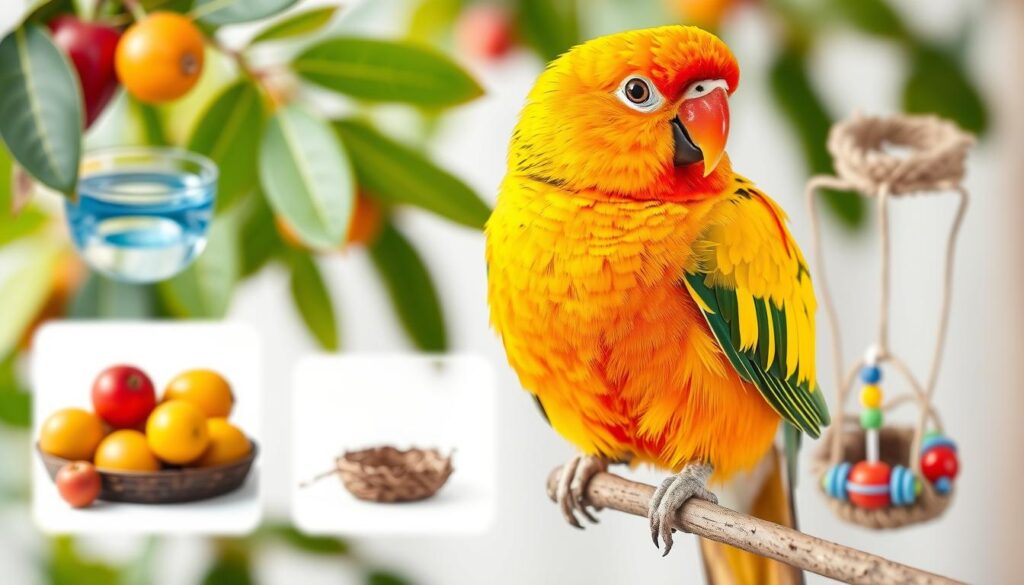
Breeding and Reproduction Guidelines
Breeding Jenday conures is both rewarding and challenging. It’s important to know the best breeding age, nesting needs, and chick care. This knowledge is key for successful breeding.
Optimal Breeding Age
Jenday conures are ready to breed at 2-3 years old. This age is best because younger birds might not be ready to care for their young. Make sure the breeding pair is close in age for better harmony and success.
Nesting Requirements
Jenday conures like to nest in enclosed, quiet places. They need a sturdy nest box that’s at least 6 inches wide and 12 inches deep. Use shredded paper, wood shavings, or a mix to line the box for comfort and safety.
Chick Care Essentials
- Watch the incubation closely, keeping the eggs at the right temperature and humidity.
- Feed the chicks a high-quality conure diet from the start to help them grow well.
- Start introducing solid foods as they get older, but still give them extra food for nutrition.
- Get the chicks used to people early on to make them friendly and social.
Breeding Jenday conures takes a lot of time, money, and effort. But, raising healthy, happy chicks can be very rewarding for those who love birds.
Cost Considerations and Initial Investment
Getting a Jenday Conure is a big financial step, but it’s worth it for the joy and friendship they offer. The jenday conure cost includes several key parts, from the bird’s price to ongoing care costs.
The price of a Jenday Conure can change a lot, from $200 to $500 or more. This depends on the bird’s age, where it came from, and the breeder’s reputation. You also need to think about the cost of a good cage, which can be $100 to $500 or more, based on size and features.
- Food and treats for a Jenday Conure can cost around $20 to $50 per month, depending on the quality of the diet.
- Toys and enrichment items, such as perches, ladders, and foraging toys, can add an additional $50 to $100 or more to the initial setup.
- Veterinary care, including annual checkups, is essential for maintaining your Jenday Conure’s health and can cost $150 to $300 or more per year.
The jenday conure cost can also depend on the bird’s gender, color, and if it was hand-raised. The total cost for the first year can be $500 to $1,000 or more.
Being a responsible pet owner means thinking about the jenday conure cost and being ready to provide the care they need. With the right planning and commitment, Jenday Conures can be wonderful and loving friends.
Conclusion
The Jenday conure is a vibrant bird that can be a great pet for the right owner. They are known for their beautiful colors, fun personalities, and loving nature. But, it’s important to know how much care they need before getting one.
Jenday conures need lots of attention, social time, and things to do. They have special food and living needs. Owners must be ready to spend a lot of time with them and give them a safe, interesting place to live.
If you’re drawn to the Jenday conure and ready to care for them, they can be wonderful pets. But, make sure you’ve thought about your lifestyle and what you can offer. With the right care, you and your Jenday conure can have a happy and fulfilling life together.

